The Port of Rabaul is situated on the island of New Britain in Papua New Guinea, inside one of the world's most impressive natural harbors, Simpson Harbour. This harbor is actually a flooded volcanic caldera, surrounded by several active and dormant volcanic cones. The port gained international notoriety following the massive 1994 eruption of the Tavurvur and Vulcan volcanoes, which devastated the old town of Rabaul.
For cruise passengers, Rabaul offers a unique, adventurous destination far from typical tourist trails. It is a small, non-industrial port where ships anchor and tender passengers ashore. The primary draws are its dramatic volcanic scenery, significant World War II history, and the rich culture of the local Tolai people.
A must-see is the landscape shaped by the region's active volcanoes. Many tours include a visit to the Rabaul Volcano Observatory for panoramic views of the caldera and the active Tavurvur volcano. Depending on seismic activity, some tours offer the chance to hike on the slopes of the volcano and see its steaming vents and nearby hot springs up close.
Rabaul is rich in World War II history, having served as a major Japanese naval base. Visitors can explore the vast network of Japanese Barge Tunnels, which were dug to hide landing barges from Allied air raids. Another significant historical site is Admiral Isoroku Yamamoto's bunker, the command center for the famous Japanese admiral.
Exploring the 'Old Town' of Rabaul itself is a unique experience. The town remains partially buried in ash from the 1994 eruption, offering a hauntingly beautiful, modern-day Pompeii-like landscape.
Last updated on June 26, 2025
The main nearby destination is Kokopo, which became the provincial capital after the 1994 eruption destroyed much of Rabaul. Located approximately 25 kilometers (15.5 miles) away, a 30-45 minute drive, Kokopo is the region's commercial and administrative hub.
For history enthusiasts, the Bitapaka War Cemetery, located near Kokopo, is a solemn and important site commemorating Commonwealth soldiers from WWI and WWII. It is about a 45-minute drive from the Rabaul tender pier.
For a nature-focused excursion, boat trips to the Duke of York Islands are popular. These islands offer pristine beaches, excellent snorkeling, and a glimpse into traditional village life, but this would likely be a full-day tour.
Last updated on June 26, 2025
Cruise ships do not dock at a pier in Rabaul. Instead, they anchor in the spectacular Simpson Harbour, which is the flooded caldera of the Rabaul volcano. Passengers are then transported to shore via tender boats.
The tender pier is located near the edge of the old, ash-covered town of Rabaul. There are minimal to no amenities such as shops, restaurants, or visitor centers at the landing point itself. The area is not a bustling town center; the main commercial and administrative center is now Kokopo, located a 30-45 minute drive away. Therefore, transportation in the form of pre-booked tours is essential to reach any attractions.
Last updated on June 26, 2025
The official currency is the Papua New Guinean Kina (PGK). While some tour operators or vendors at the pier may accept US dollars for convenience, it is not widely practiced and you should not rely on it. Small US denominations are best if you plan to try.
Credit cards are rarely accepted, so it is essential to have enough cash for any purchases, meals, or gratuities. ATMs are scarce in Rabaul and may not be reliable. It is highly recommended to exchange currency on your cruise ship or bring sufficient Kina with you.
Last updated on June 26, 2025
While Papua New Guinea has a reputation for crime in its larger cities, Rabaul and the surrounding East New Britain Province are generally considered safer for tourists. However, visitors should still exercise a high degree of caution. It is strongly recommended to explore the area as part of an organized tour from the cruise line or a reputable local operator rather than venturing out independently.
Avoid walking alone, especially in isolated areas or after dark. Do not display overt signs of wealth such as expensive jewelry, cameras, or large sums of cash. Always be aware of your surroundings and keep your belongings secure. Following the guidance of your tour leader is the best way to ensure a safe and enjoyable visit.
Last updated on June 26, 2025
Rabaul features a tropical rainforest climate, characterized by hot and humid conditions throughout the year. Cruise passengers should expect average daytime temperatures to be consistently around 30-32°C (86-90°F). The humidity levels are very high, which can make the heat feel more intense.
Rainfall is possible at any time, often occurring as heavy but brief downpours. The wettest season is typically from December to March, while the 'drier' season runs from May to October. Regardless of the season, it is wise to be prepared for rain. Recommended attire includes lightweight, breathable clothing, a wide-brimmed hat, sunglasses, and strong sunscreen. A rain poncho or umbrella, insect repellent, and sturdy, comfortable walking shoes are also essential items.
Last updated on June 26, 2025
Standard transportation options for tourists are very limited in Rabaul. There are no ride-sharing services like Uber, and metered taxis are not available. The primary mode of local public transport is the PMV (Public Motor Vehicle), which are typically minibuses or trucks, but these are not recommended for visitors due to safety concerns and erratic schedules.
Virtually all cruise passengers explore Rabaul via pre-booked shore excursions which include transportation. This is the safest and most reliable way to see the sights. If you do attempt to hire a private vehicle, be sure to negotiate the price and itinerary very clearly before beginning your journey.
Last updated on June 26, 2025
Shopping opportunities in Rabaul are primarily centered around local markets rather than conventional stores. The main Rabaul Market is a vibrant, bustling place where locals trade produce and goods. On cruise ship days, a smaller craft market is often set up near the tender pier for convenience.
Key souvenirs to look for are traditional handicrafts. These include intricately woven bags known as 'bilums', carved wooden storyboards and masks, shell jewelry, and pottery. Items made from volcanic ash are also a unique local specialty. Polite bargaining is common and expected at the markets, but always do so with a friendly demeanor. There are no duty-free shopping centers available.
Last updated on June 26, 2025
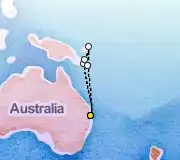
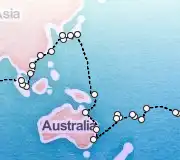
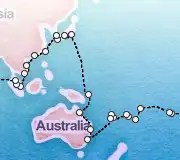
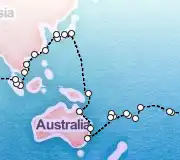
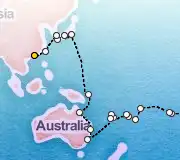




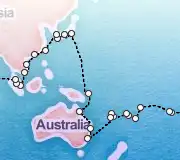
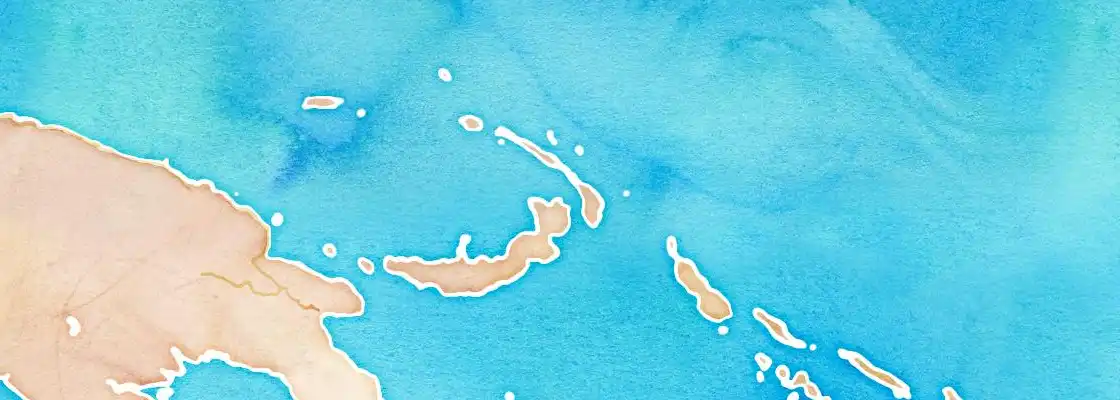
No ships scheduled in port today.
On average cruises visiting Rabaul are extremely affordable compared to other itineraries. See the diagram below for the average cost per day by month. Sailings visiting Rabaul during the the peak season of winter are much more expensive than the the low season of spring.
Want to hear about the best deals and cruise tips every week? Sign up for our free weekly VIP Newsletter, customized exactly to your preferences!